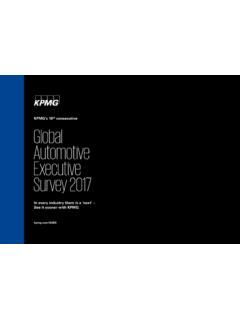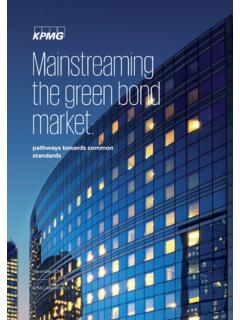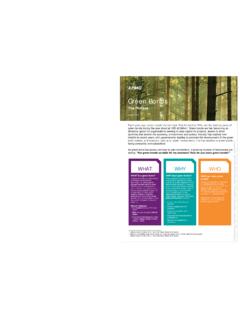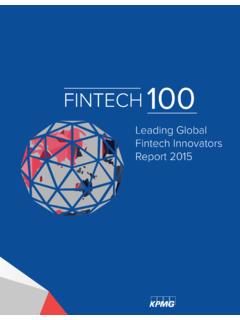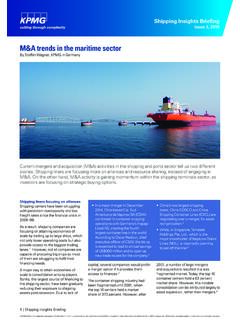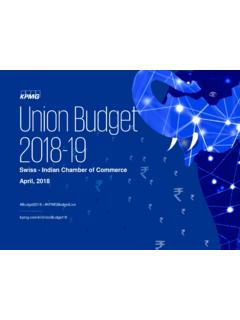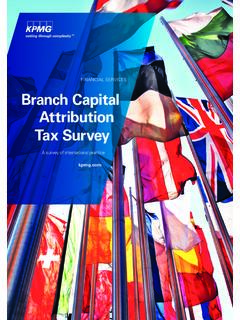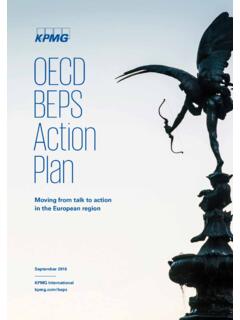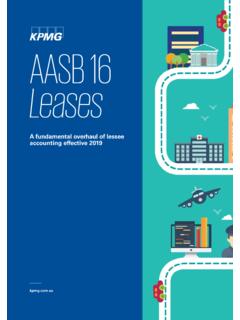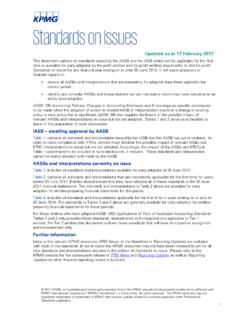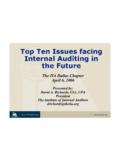Transcription of Audit 2025: The future is now - KPMG US LLP
1 TABLE OF CONTENTS. FOREWORD .. 2. INTRODUCTION .. 3. METHODOLOGY .. 4. KEY FINDINGS .. 5. AUDITORS SHOULD LOOK TO THE future .. 6. A MORE HOLISTIC VIEW .. 8. ORGANIZATIONS ENCOURAGE CONSTRUCTIVE CHALLENGES .. 10. TECHNOLOGY, COMMUNICATION AND CRITICAL THINKING SKILLS ARE KEY .. 11. BIGGEST CHALLENGES AUDITORS FACE .. 12. LOOKING FORWARD .. 13. ACKNOWLEDGMENTS .. 14. COPYRIGHT 2017 FORBES INSIGHTS | 1. FOREWORD. KPMG and Forbes Insights conducted a survey of CEOs, CFOs and other financial executives regarding their views on the future of Audit in relation to quality, insights and overall value. We were specifically interested in knowing how new technologies and the explosion of data were changing the profession since the release of the Audit 2020: A Focus on Change report in 2014.
2 What became clear is that the auditing profession has continued to see unprecedented change. The accelerating pace of change in advancing technologies relating to data, advanced analytics, robotic process automation, cognitive and emerging innovations will play a pivotal role. New technologies are important and need to be matched with people who know how to effectively use these tools. Clients also increasingly expect the auditor to provide a more forward-looking view of the world and insights that can add value as management and boards seek to effectively move their organizations forward. In this most recent report, Audit 2025: The future Is Now, we returned to the C-suite and other finan- cial executives to see if their perspective and views on the profession had changed over the past sever- al years.
3 As you read through the findings in this report, you will see that the vast majority of respondents believe auditors should use bigger samples and more sophisticated technologies for data gathering and analysis. Most significantly though, those surveyed say the Audit should help identify risks, present a forward-looking view of data and provide greater transparency. We hope you find this Forbes Insights and KPMG-sponsored report informative and thought-provoking. Along with the latest views from directors, management and academia, you will find comparative data that highlights some of the mindset changes around the Audit . At KPMG, we are applying innovative new tools, including data analysis and analytics, robotics and cog- nitive technology, to help our talented professionals transform the financial Audit and to promote the quality of work we perform for the capital markets and other stakeholders that we serve.
4 KPMG LLP. 2 | THE future IS NOW. INTRODUCTION. With technology advancing at an unprecedented pace and enabling organiza- tions to harness and analyze more data than ever before, the financial Audit is poised for profound and rapid change. Technology, combined with the exper- tise of today's skilled auditor, allows Audit professionals to take a much deeper dive into the financial facets of an organization and provide insights that result in more-informed decisions in support of a high-quality Audit . To learn more about what organizations expect from Audit in the future , Forbes Insights, in con- junction with KPMG, surveyed 200 CFOs, chief Audit officers, chief tax officers, Audit committee members and other financial executives. We found that organizations are seeking enhance- ments in a number of areas, including risk man- agement, fraud protection, a forward-trending view of data and identifying critical issues for man- agement.
5 Nearly 80% of respondents say auditors should use bigger samples and more sophisticated tech- nologies for data gathering and analysis in their day-to-day work. Nearly half say auditors should perform a deeper analysis in the areas they already cover, and two-thirds say auditors must improve their communications skills, critical think- ing skills and technology skills. Nearly 80% of respondents say auditors should use bigger samples and This report analyzes areas in which Audit needs to more sophisticated technologies for evolve and what auditors need to do to keep pace with the changing expectations of clients. data gathering and analysis Organizations are increasingly expecting more from Audit and a more forward-looking view that helps identify and address critical issues.
6 More important, while organizations understand that technology will continue to evolve, they want to see some significant changes in the approach to Audit sooner rather than later. The future is now, and auditors must embrace it. COPYRIGHT 2017 FORBES INSIGHTS | 3. METHODOLOGY. This report is based on a survey of 200 respondents in the in October 2016 (46 Audit committee chairs and members, 62 CFOs, 19 chief Audit offi- cers, 18 chief tax officers, 21 controllers and 34 directors of financial reporting). Responses came from a range of sectors, including, but not limited to, finan- cial services, consumer products, healthcare, technology and retail. All came from organizations with $500 million or more in annual revenue. Titles: CFO.
7 8%. 9% Director of Financial Reporting 31% Audit Committee Member 10%. Controller 11% Chief Audit Officer 15% 17%. Chief Tax Officer Audit Committee Chair Note: Does not add to 100% due to rounding. Industries: Technology, Media and Telecommunications 19%. Consumer Products 18%. Healthcare and Pharmaceuticals 18%. Retail 15%. Financial Services (including Banking and Insurance) 13%. Manufacturing 9%. Industrials 6%. Mining, Gas, Energy and Utilities 3%. Government, Public Sector 2%. Note: Does not add to 100% due to rounding 4 | THE future IS NOW. KEY FINDINGS. Nearly 80% of respondents believe that in their day-to-day work auditors should use bigger samples, and 78% believe auditors should use more sophisticated technologies for data gathering and analysis.
8 Almost half (47%) say auditors should perform a deeper analysis in areas they already cover. Nearly two-thirds (62%) of respondents want their auditor to artic- ulate a clear point of view on critical issues. While 56% want to leverage data and analytics into actionable insights, another 47%. want auditors to constructively challenge client management. Sixty percent of respondents believe audits should help in assess- ing risks and risk management practices. More than half (52%) are looking for a forward-trending view of risks, and 48% are looking for a forward-trending view of data. Nearly half (47%) want more transparency about arriving at the Audit opinion and what has been learned during the Audit . For- ty-three percent of respondents seek more insight on proactive qual- ity assurance and regulatory compliance, and the same number would like to gain more understanding of areas not covered by Audit .
9 Forty-two percent would like a more holistic view of the state and prospects of the organization. Respondents believe that the biggest challenges to enhancing the impact of Audit are the regulatory environment (66%), budget (57%), the litigation environment (55%) and data security (55%). Clients are also looking for increased technology skills (67%), com- munication skills (66%), critical thinking skills (65%) and investigative financial skills (59%). COPYRIGHT 2017 FORBES INSIGHTS | 5. AUDITORS SHOULD LOOK TO THE future . It is clear from the Forbes Insights and KPMG study that auditors need to be more forward-looking on several fronts. In addition to calling for auditors to an- alyze bigger samples and perform a deeper analysis, nearly half (45%) of survey respondents say that the scope of the Audit should be expanded to include coverage and findings related to fraud risks and the organization's risk management processes, improved focus and analyses with respect to IT.
10 Systems, and other issues valued by stakeholders. Risk and risk management practices with an Like many, Stansbury says the most important role eye toward the future was a recurring theme of both internal and external auditors is to provide among respondents. As Chris Stansbury, CFO of assurance with respect to controls and the finan- Arrow Electronics, says, Clients are no longer cial statements; when done effectively, the Audit looking for just a rearview mirror view, but a view findings can support the organization's efforts to through the windshield on where we are going anticipate potential issues and eliminate surprises. and how to navigate the landscape of risks, They also expect the auditor to communicate opportunities, changing regulations, competition effectively, sharing information clearly, in a timely and globalization.
